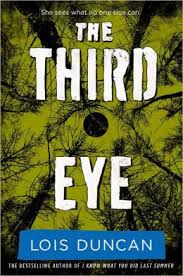Karen doesn’t want to be different, but she is. Every once in awhile, she knows things, or has visions. And when she has a vision of a lost boy trapped in the trunk of a car—a boy that she was supposed to be supervising—others start to realize it too. Which leads to a cop asking for her assistance in a missing child’s case—and publicity she really doesn’t like.
Which, I guess, is one of the major negatives with having The Third Eye.
Spoilers ahead!
I say one of the negatives, since another negative is that Karen doesn’t just have visions of these missing children: in the second case, she also experiences painful and upsetting flashbacks of the child’s entire life. This, as she is bombarded with anxious requests from parents with their own missing children, begging her for assistance. Karen, totally freaked out, declines all requests, choosing instead to focus on finishing high school and trying to repair her somewhat damaged relationship with her boyfriend, Tim.
Why, I don’t know. To start with, the first missing kid happened to be trapped in the trunk of Tim’s car, and although that wasn’t Tim’s fault, to continue with, Tim, like pretty much all Boyfriend Number One boyfriends in Lois Duncan novels, is more than a bit of a jerk.
Unfortunately, Tim, being Tim, and in high school, suggests that Karen use her gift to cheat on a test; when she refuses, that more or less ends the relationship, making me wonder why she bothered. Her mother, who only wants Karen to be normal, flips out again. With all this, it’s a really open question as to just why Karen’s post-high school graduation plans involve working at a preschool, and why—after freaking out about strangers following her—she knowingly gets into a van with a stranger. Sigh. Or the issues with the mildly manipulative cop who wants to use her gifts, although at least in his case he has reason to believe in psychic powers (Karen is the second psychic he’s encountered) and a personal reason for getting involved.
On a minor note, I’m…. not really happy with the kidnapped white children adoptive babies plot, but that’s really a sidenote to the larger issues here.
By this point, part of the problem is that certain elements of Duncan’s books have become somewhat—how can I put this—predictable. Karen’s parents definitely are not going to understand her, or claim that to make things up. The good looking boyfriend Karen is with, who brought her—temporarily—into the popular crowd, making her almost feel normal again, is, no surprise, going to turn out to not care as deeply as she thought he would, be mildly bad news (if not necessarily a terrible person), and be seen dating someone else by the end of the book. Karen will end up with someone else who doesn’t look as good on paper, but have her relationship with that someone else have a questionable future. (Slightly less questionable than in other books here, but still.) Karen (and readers) will accept that the psychic phenomena she’s sensing are absolutely real, and accept it as part of her destiny. And, oh, yes, Karen will be in grave danger again and need to be rescued by someone. The only real difference is that this time, it’s not someone in a sibling role doing the rescuing.
All that said, The Third Eye does take one new tack for Duncan, in that, for a change, this book focuses on the relationship between Karen and her mother, and, to a lesser extent, her father. Karen’s mother wants only one thing: for Karen to be normal. Not out of malice, but because she honestly believes that being normal is the only thing that will make Karen happy. And so, she tries to twist Karen into that normal state, through guilt trips, peer pressure, and direct orders. We’re not immediately meant to sympathize with Karen’s mother, presented as the closest thing to an antagonist that this book has. But we are, I think, meant to sympathize later, when Karen’s mother explains her reasoning: that years later, these psychic powers came close to destroying her marriage and harming Karen, and that she was desperate to prevent Karen from going through the same hell.
The main issue is, as Duncan notes, parents can’t completely protect their children, gifted or not, from sorrow and pain. And of course, this is a nice setup for a very nice message: Karen’s mother has never been happy because she’s never accepted her gifts. By accepting her gifts, Karen has a chance for happiness. The classic idea that trying to be normal won’t make you happy; accepting your unique skills will.
But this very nice message is undercut by one very real problem: another psychic that Karen meets, Anne Summers, has been shot and nearly killed, showing that Karen’s mother is a lot more justified in her fears than the text allows. At the same time, it’s difficult to sympathize with either Karen or her mother when they try to repress their abilities. Partly because Anne Summers’ injury isn’t treated, in the text, as a “this is what happens to psychics when they go public,” mostly because Karen and her mother have very real gifts that could help save kids. And they are standing by.
This book could have a lot to say, I think, about mothers and daughters, about using your talents or keeping them hidden, about power dynamics. But it never quite reaches that level, and frankly, after yet another Duncan book where the teenage heroine needs to be saved (although at least this one gets one scene where she saves herself) I was about to throw up my hands in irritation. It’s another fast read, and one that will satisfy Lois Duncan fans, but it left me gritting my teeth just a little. Fortunately, later books got better.
Mari Ness lives in central Florida.










